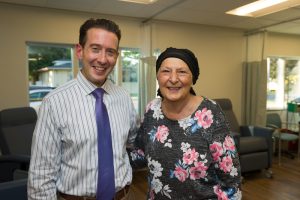
Early Signs of Inflammatory Breast Cancer
Regional Cancer Care Associates (RCCA) provides comprehensive treatment of cancer and blood disorders to patients throughout New Jersey, Connecticut, and the Washington, DC, area. Here,
HIPAA Alert: Potential Data Breach Learn More
Questions on Oncology, Hematology and/or Infusion Clinical Services due to COVID-19 Crisis – CALL 833-698-1623
Important Information for Our Patients Regarding the Coronavirus.
RCCA Providing Area Cancer Patients with Access to Care During Coronavirus Outbreak
RCCA Offering Patients Virtual Visits During Coronavirus Pandemic
Invasive lobular carcinoma is a form of breast cancer that develops in the milk glands rather than the milk ducts of the breast. It has a unique biology that requires a different approach to detection and treatment than other types of breast cancer.
Regional Cancer Care Associates (RCCA) treats breast cancer and other cancer types and blood disorders in New Jersey, Connecticut, Massachusetts, and the Washington, D.C. area. RCCA’s oncologists offer innovative treatments like targeted therapy and hormone treatments, to help patients obtain the best outcomes possible.
Invasive lobular carcinoma (ILC) is a less-common type of breast cancer that forms in the milk glands. This differentiates it from the most common form of breast cancer, invasive ductal carcinoma (IDC), which forms in the ducts that carry milk from the glands to the nipple. The Breast Cancer Research Foundation estimates that about 15% of new breast cancer diagnoses are ILC.
Breast cancer, like other types of cancer, is caused by abnormal cell development. Cells are supposed to reproduce at a consistent rate to replace other cells that die. When cells turn cancerous, however, they multiply much more quickly than normal. The resulting mass quickly crowds out healthy cells. Over time, the growth spreads to surrounding tissue. This spread is what makes a cancer invasive.

As noted, ILC has a unique biology. As a result, its signs and symptoms can differ from those seen with other breast cancers. ILC doesn’t always have symptoms at the start. Noticeable signs may not develop until its later stages. They can include:
Unlike other breast cancers, ILC usually does not create a lump. This is because its cells develop in straight lines rather than in a condensed mass. The lack of a lump can make ILC more difficult to detect. Therefore, routine mammograms are essential to detect ILC in its early stages.
Cancer is a progressive condition, meaning it gets worse as time goes on. Breast cancer stages are used by doctors to describe and monitor the disease. Cancer moves from lower to higher stages as the tumor grows and as cancer cells spread. The stages are:
The survival rate for ILC is highest in its early stages. Most patients diagnosed with Stage I and II will have a successful treatment with a low risk of recurrence. Treatment becomes more difficult in later stages, which is why early detection is vital.
Most cases of ILC are detected through routine mammograms. A positive mammogram will show a tissue abnormality, calcifications, or other possible indicators of cancer. These indicators aren’t always caused by cancer. If they appear on a mammogram, the doctor will request additional tests to ensure an accurate diagnosis. Tests used to diagnose ILC include:
Mammograms use specialized X-ray equipment to take images of breast tissue. Diagnostic mammograms are similar to routine mammograms but typically take additional pictures at different angles. This allows for a more thorough analysis when evaluating a problem.
Ultrasound scans are sometimes used to confirm or complement mammogram results. They are an imaging technology that uses sound waves. The resulting images are usually focused on a specific part of the breast, allowing doctors to assess a suspicious area.
Biopsy tests use a hollow needle to remove a small amount of tissue or fluid from the breast. This sample is then looked at under a microscope. Pathologists look for abnormalities in the cell structures, which can indicate whether the cells are healthy or cancerous.
The preferred treatment for ILC is surgery. Depending on how big the tumor is and how far it has spread, one of two procedures may be used:
The lymph nodes in and around the breast are often the first place to which ILC spreads. If they are affected, a sentinel lymph node biopsy (SLND) or axillary lymph node dissection may also be performed. These procedures remove the cancerous nodes and are performed to stop cancer from spreading further.
Radiation therapy is commonly used after surgery, especially for middle-stage ILC. This procedure targets cancer cells with a focused dose of radiation to kill any cancerous cells that were not removed with surgery. There are two main types of radiation therapy:
When cancer has spread, systemic therapies may be prescribed. These are treatments that affect the whole body, not just the breast, making them a good option for slowing the spread of cancer. They can be used to shrink tumors before surgery or as a follow-up to surgery or radiation. The various types of systemic therapy include:
If ILC reaches Stage 4, it is called metastatic breast cancer. While there currently are not therapies that cure Stage 4 ILC, there are several treatments that can prolong life – often for several years – and that are well tolerated, providing a good quality of life.
Access cutting-edge treatments for invasive lobular carcinoma at Regional Cancer Care Associates. RCCA has more than 20 locations near you in New Jersey, Connecticut, Massachusetts, and the Washington, D.C., area, offering community-based treatment for cancer and blood disorders. Patients have access to comprehensive care, including targeted therapies and clinical trials when suitable. Contact us for more information or to request an appointment for ILC treatment.
What is invasive lobular carcinoma?
Invasive lobular carcinoma (ILC) is breast cancer that originates in the milk glands and has spread beyond its point of origin.
What are the symptoms of invasive lobular carcinoma?
ILC rarely causes symptoms in its early stages. In later stages, symptoms can include:
Does invasive lobular carcinoma create a lump?
Unlike other forms of breast cancer, ILC rarely creates a lump. This is because ILC tumors grow in lines rather than masses.
What treatments are available for invasive ductal carcinoma?
Most ILC cases are treated with surgery. Radiation therapy is sometimes used to target cells that surgery can’t remove. Systemic treatments like chemotherapy, targeted therapy, immunotherapy, or hormone therapy may also be used to shrink the tumor before surgery or following surgery.
Breast cancer patients can seek the most comprehensive, patient-centered care that the area has to offer at Regional Cancer Care Associates. Our network of highly experienced doctors works together to deliver the care and support you need for all aspects of your life. Call your local RCCA office to learn more about breast cancer or to schedule an appointment for a consultation today.

Regional Cancer Care Associates (RCCA) provides comprehensive treatment of cancer and blood disorders to patients throughout New Jersey, Connecticut, and the Washington, DC, area. Here,

When people think of breast cancer, they generally think of it affecting women. However, in rare circumstances, breast cancer can affect men, most commonly in

First diagnosed with breast cancer in 1992, she has persevered in her battle against the disease for more than 30 years.
When standard cancer treatments aren’t providing the results you want, clinical trials may offer hope. Our physicians use clinical trials to study new treatments, helping transform cancer care for the better. You can enroll in a clinical trial to try groundbreaking treatment plans at zero cost to you.

Regional Cancer Care Associates is one of fewer than 200 medical practices in the country selected to participate in the Oncology Care Model (OCM); a recent Medicare initiative aimed at improving care coordination and access to and quality of care for Medicare beneficiaries undergoing chemotherapy treatment.